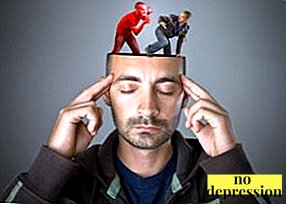Stress disrupts the whole body. After a traumatic situation, a long recovery period is required.
A modern person often has a question about how to recover from stress. Psychologists give about this useful tips.
What is post-stress syndrome?

Poststress syndrome, otherwise called post-stress disorder, is a complex of syndromes.
Term introduced psychologist Horowitz in 1980. It occurs after a very strong stress, an unusual situation associated with a traumatic impact on the human psyche.
The syndrome is characterized by the presence of anxiety, depression, nervous tension associated with the memories of the event.
As a result of constant stress, patients develop a complex of symptoms, talking about depletion of the nervous system. In addition, it affects the health of the organism as a whole.
Post-stress disorder usually occurs some time after the traumatic event. It occurs approximately in the period from 3 to 18 weeks.
Post-stress disorder can be caused by the death of a loved one, the threat to life, violence, the event seen causing a nervous shock, a man-made disaster.
At the same time, a stressful event and a state of threat to life associated with the emotions of fear, feelings of hopelessness, are experienced.
It can occur both directly from a person who is in danger, or from an observer. The severity of the symptom may be the same. That is why the participants of any events involving a threat to life need the help of psychologists.
Health effects

What can lead to constant stress?
Doctors and psychologists know that stress affects all body functions.
As a result of constant exposure to stressors, health deteriorates significantly, while it can be quite difficult to restore it.
What is the danger of constant stress?
Chronic long-term stress leads to the following problems:
- Digestion is impaired. There is a feeling of heaviness in the stomach, it becomes difficult to eat. Lost your appetite. Or, on the contrary, on the background of stress, a person begins to eat a lot, not controlling himself. Against the background of stress, there is the likelihood of developing bulimia and anorexia.
Symptoms such as heartburn, diarrhea, pain in the liver and pancreas may be associated with improper diet.
- Allergic reactions, pruritus, rash.
- Insomnia appears. A person begins to fall asleep badly, often wakes up at night, it is hard to get up in the morning, while he gets sleepy during the day.
- There is a high risk of development cardiovascular disease.
- Immunity weakensAs a result, a person often suffers from colds.
Among women:
- Violated menstrual cycle, until the complete cessation of menstruation.
- The microflora is broken, the risk of developing thrush increases.
- Sexual attraction disappears.
- There are difficulties in achieving orgasm.
- For pregnant women there is a risk of miscarriage, early and problematic delivery.

In men:
- Libido decreases.
- There is a risk of impotence.
Consequences of high impact
What is the consequence of severe stress? Strong stress upsets all body systems triggers the destruction mechanism. A person is in nervous excitement, can act without being aware of his actions, or, conversely, being in shock, not reacting to anything.
Stress is designed to protect the human body, preventing more dangerous consequences. At the time of a dangerous situation, a person can remain relatively calm.
That is why the effects of stress may not be immediately apparent, and after some time, since during the period of influence of the stress factor the organism must mobilize in order to survive.
Effects:
- nervous tics;
- tearfulness;
- memory loss;
- apathy;
- decrease in interest in what is happening;
- obsessive habits;
- guilt, especially when a person has survived, and someone is not;
- alcohol abuse, psychotropic substances.

How does it affect the human body?
Stress affects not only the nervous systembut also the human body.
- Increases the risk of heart attack, stroke. Initially, there may be tachycardia, pain in the heart, periodic high blood pressure.
- Headaches are becoming more frequent.
- Due to improper nutrition, metabolism is disturbed.
A person can lose much weight or gain it in a short period of time.
- Feels constant fatigue.
- It is difficult for a person to sleep through the recommended 7-8 hours - he does not sleep well, often wakes up at night.
- After a stressful situation, body temperature may rise.
- The concentration of attention decreases.
- Increased risk of developing cancer.
Is it possible to die?

From exposure to severe stress can die at any age.
The main reason for this is fear and cardiac arrest. Even the most powerful organism can not cope with the stressor.
Under the influence of fear, hormones are secreted and a “run or hide” reflex appears. is he ensures the survival of the individual.
This increases the heartbeat, there is tension in the muscles, increased energy levels, and a weak body may simply not cope with this condition. There are deaths from sudden fright.
During pregnancy
Doctors do not recommend pregnant women to be exposed to stress, as this directly affects the condition of the fetus and the course of pregnancy.
The consequences of stress for the expectant mother:
- Increased risk of miscarriage.
- Risk of preterm delivery.
- It is believed that the child feels the state of the mother, and her nervous tension is transmitted to him.
- During exposure to stress, the child may not receive enough oxygen.
- Increased risk of developing autism.
- During stress, hormones change, stress hormones enter the body of a child, and as a result, after birth, it will tend to stress situations.
- Low fetal weight due to lack of oxygen and nutrients.
- Malposition. It is associated with a periodic hypertonus of the uterus, and the child does not have time to settle down normally by the time of birth.
Why do you want to sleep?

Stress is associated with the strongest nervous system tension and unbalance the work of the whole organism.
Adrenaline is released, the heartbeat rises, the metabolism changes.
The person is in a state of readiness - escape. Eventually, when the stress subsides, there is a state of extreme fatigue and it takes time to recover.
How to move away from him and recover?
You can not ignore the symptoms of stress, it is necessary to take measures to restore the body. If you are in a life-threatening situation, then it is recommended to consult a specialist.
The first thing that is necessary is to restore the calm of the nervous system, since the work of the rest of the human organs depends on it.
How to restore composure?
After exposure to adverse factors, the body and the nervous system need rest. It is necessary to eliminate the possibility of any traumatic situations. A calm, relaxed atmosphere is recommended.
Rules for recovery from mental stress:
- Full rest.
- Reducing the level of information noise - the impact of the TV, computer.
- Light physical exertion.
- Recovery of appetite.
- Often walking in nature - contemplation of trees, soothes the river. If you go to the park, then choose places where there are less people.
- Do nice things not only for yourself, but also for other people.
- Try to bring more positive things into your life - positive emotions help to combat the effects of adverse factors on the nervous system.
- Do not dwell on what happened - try not to think about the stressful situation, say "stop" to your thoughts if there are negative pictures.
- Visit a psychotherapist who teaches how to deal with the effects of stress.
- Visit several classes where you will learn meditation. Yoga helps to restore peace of mind.
- Go to the pool or swim in natural waters - the water soothes, relieves tension from the muscles.
- When you feel nervous tension, take a contrast shower.
- Drink tea with healing and soothing herbs - chamomile, mint, melissa, lavender, and St. John's wort.
Consider the presence of contraindications.
- Listen to positive and soothing music.
- Restore sleep.
- Chat with pets, sign up for horseback riding lessons.

How to normalize sleep?
The problem of sleep is one of the most common straining factors after exposure. The usual rhythm of sleep can be restored for a long time..
How to help the body:
- Two or three hours before bedtime, try not to worry.
- In the afternoon, do not watch the news, emotionally colored films.
- Drink tea before bedtime with a soothing effect.
- Frequent walks in the fresh air. In the evening, a half-hour walk is useful, but not to extreme fatigue.
- Do not drink alcohol, coffee and strong tea before bedtime.
- Create comfort around you - a soft bed and a blanket, a pleasant atmosphere.
- Airing a room - stale air causes bad sleep and headaches.
- Meditate before bedtime. If you do this lying down, you will fall asleep naturally.
- Learn to turn off negative thoughts.
- Try to lie down and get up at the same time - so the body gets used to a certain period of rest and reflexively begins to want to sleep at the appointed hour.
Even if you do not sleep well, still get up on the alarm clock.
- Give yourself the opportunity to relax on the weekends and lie down in bed for a little longer, but try not to switch to waking at night, as this quickly disrupts sleep patterns.

How to return the appetite?
It is difficult to force yourself to eat when the body is in tension.
What to do:
- To realize that proper and proper nutrition is necessary for maintaining health and high performance.
- There is a schedule in small portions.
- Try to get pleasure from the process of eating - take a beautiful dish, decorate the dish, cook a delicious meal.
- Eat light foods - vegetable salads, lactic acid foods, include boiled or stewed veal, chicken, turkey.
- More often in the fresh air - walks and physical activity increase appetite.
- If you consume too much food, limit its amount. At the same time in the food should be healthy foods. Do not seize the stress - use other ways to calm the nervous system.

What to do with weakness?
If after stress you feel tired, then you need to allocate time to rest. Find a quiet place, relax. It is useful to sleep twenty minutes for the body to recover a little.
Do not use invigorating drinks - they even more wear out the nervous system, it is better to drink tea with chamomile or melissa.
Stress requires attention, You can not ignore its effect on the human body. Therefore, when exposed to any adverse and dangerous situations, it is important to properly restore the nervous system and relieve it from overload.
How to restore the nervous system after prolonged stress:



